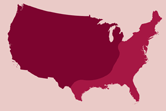
 A small news article from Science has been taped above my desk for the last few years. I don’t remember who originally gave it to me, or why I even hung it up, but there it is, nestled between a couple XKCD cartoons. The article is titled “The Wine Divide” and it raises many questions about sustainability, inherent biases in conventional wisdom, and what the term “local” means in a global economy. And it’s about wine.
A small news article from Science has been taped above my desk for the last few years. I don’t remember who originally gave it to me, or why I even hung it up, but there it is, nestled between a couple XKCD cartoons. The article is titled “The Wine Divide” and it raises many questions about sustainability, inherent biases in conventional wisdom, and what the term “local” means in a global economy. And it’s about wine.
The basic premise of the article is that, in general, the carbon-cost of shipping wine by freight (as in, on a truck) is greater than the cost of shipping by cargo (as in, on a boat). In wine, transportation outweighs all other aspects of production and distribution, so using the cost of transport, two scientists calculated the cost of buying wine from Napa Valley or Bordeaux, France if you live in New York.
Shipping a 750-milliliter bottle from Bordeaux to New York City emits 1.8 kilograms of carbon, whereas trucking one from the Napa Valley emits 2.6 kg.

They also calculated a Napa-Bordeaux line, which determines which region (Napa Valley or Bordeaux) has the lower carbon cost for where you live.
In a thorough review of the life cycle of a bottle of wine, Colman and Päster presented some surprising insights into the real cost of transportation. Among the most counter-intuitive results is how dramatic the differences among ships, trains, trucks, and airplanes really are. This is scaled by the total amount of cargo shipped, so while the actual amount of fuel burned may be greater, the amount of goods transported is even larger.

These data challenge the conventional assumption the local is better. For many goods, distance is significantly less important than the method of delivery, at least when looking at the cost of transportation. For someone living on the East Coast of the United States, wine from Bordeaux, France is more sustainable than the relatively closer wine from Napa Valley, California.
Tyler, Colman, & Päster, Pablo (2009).
Red, White, and ‘Green’: The Cost of Greenhouse Gas Emissions in the
Global Wine Trad Journal of Wine Researc, 20 (1), 15-26
I also found this paper fascinating when it came out, but for me the real lesson was that consumers shouldn’t have to think about this sort of complexity. If we could just put a price on climate-changing pollution – either through cap-and-trade or a carbon tax – then every product’s price would automatically reflect the societal cost of its carbon footprint.
We’d still be able to buy both Napa-bottled and Bordeaux-bottled wines here in the East, but in buying the former we’d have to pay for the extra pollution.
It makes it so much harder for consumers when there aren’t simple solutions like ‘local is better’. What I would love to see is better labeling. Just as our food in UK supermarkets has a little pie chart or equivalent on the packaging saying how much fat etc it contains, it would be great to see ‘GHG emissions in transport’ etc. Then consumers have the power to makes choices
At work I’m doing a report about small businesses and how they can protect biodiversity. Certification is certainly something I intend to research for it
I’d also consider factoring in the unfortunate trend of heavier Napa/Sonoma red wine bottles… a trend particularly obvious on so-called “super Cabs” and California faux-Bordeaux. While bottles by Orin Swift Cellars are particularly egregious examples (you can stun an ox with a bottle of Mercury Head Cab), more and more California red wines are coming in heavier packaging. Bottles are becoming bigger, glass is becoming thicker, and I’m becoming irritated.
Weighty bottles are a pain. Cases of it are hard to lift and cost more to ship. Heavy cases take more fuel to fly around the planet.
Case in point: A 750ml Bordeaux-style bottle from Coastal Ridge Merlot (2005) was 2 lbs. 12 oz., while the an identical volume of Shafer Hillside Select (2003) weighed in at 4 lbs. 6 oz. That’s ri-fucking-diculous!
So if bottle heft continues to grow as a proxy for quality or prestige, any carbon savings on buying domestic may approach zero sum.
This debate has been going on for some time: http://www.decanter.com/news/wine-news/485982/wine-heavyweights-attack-heavy-bottles
What’s the argument for heavy bottles? Just prestige?
Wouldn’t it be great if vintners shipped their wine in casks and let the local distributor bottle them on site with recycled bottles?
I was a big fan of the French wine group that began shipping their wine by sail a few years ago: http://www.guardian.co.uk/environment/2008/feb/24/food.carbonemissions
I wonder what happened to them…
Know what’s an even smaller carbon footprint for customers in NY? Buying actual local wine as opposed to pretending California can be considered “local” to NY. NY does have vineyards.
I second Kim. Most states have some pretty good wineries of their own. I’m much more of a beer snob than a wine snob, but while I lived in RI I had some pretty tasty wine made right there in Lil’ Rhody (try the Sakonnet Rhode Island Red if you ever get a chance). Talk about local, that stuff probably traveled for about an hour tops. I haven’t had a chance to check out any local NC wines (and always welcome recommendations) but I’d definitely get those over Californian and French wines, if for not other reason than my love of local alcohol.
Biltmore has some pretty good wines, but the classic styles from around here are Scuppernog and Muscadine, which taste as good as they sound 🙁
I know that hard-cord vinophiles will turn up their nose at this, but Biltmore’s annual “Festival of Flowers” spring blend is one of my favorites. It’s a little different every year.
But yeah, Muscadine is nauseating.